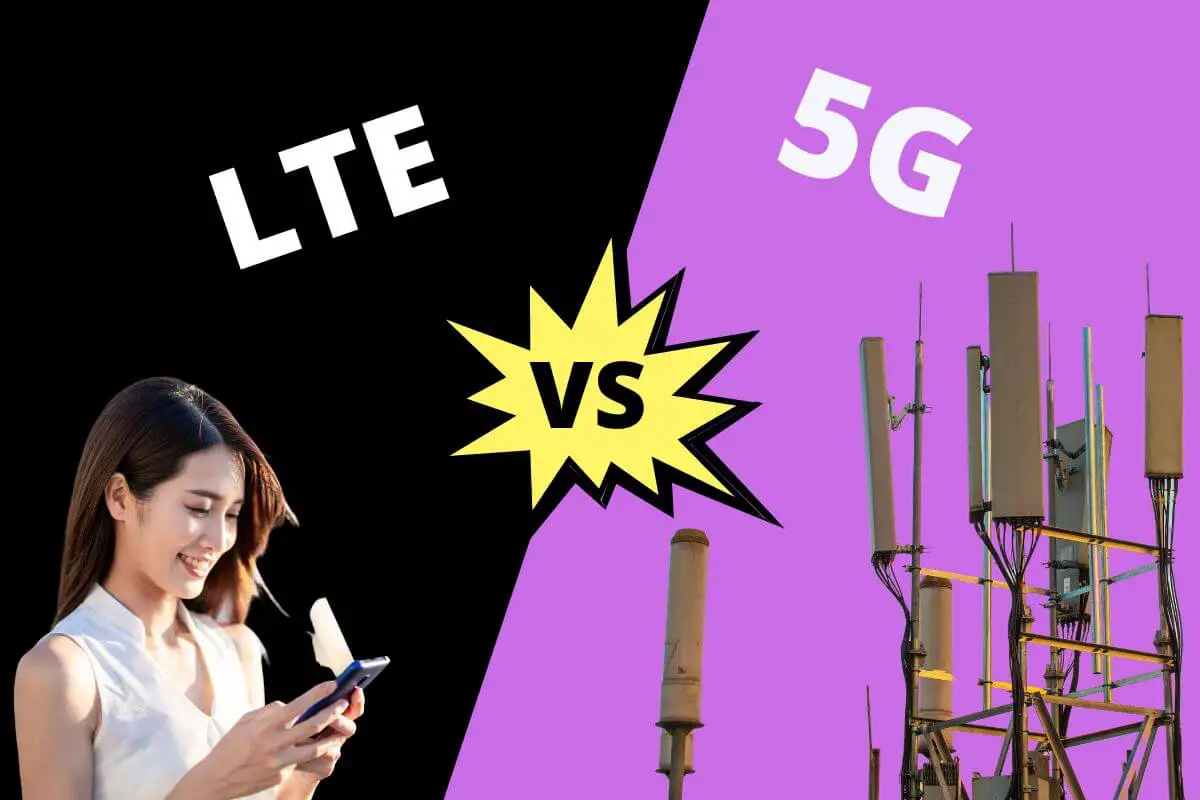The main difference between LTE and 5G is the higher frequency bands in 5G than in LTE. There are minimal traffic congestion issues in 5G than in LTE.
4G LTE (long-term evolution) and 5G (fifth-generation) are two popular mobile network technologies. While the LTE standard was finalized in 2008, 5G entered the market in 2019.
Read on to understand the other differences between these two carrier technologies.
Table of Contents
LTE vs 5G
| LTE | vs | 5G |
| Sub-6 GHz range and millimeter-wave frequencies of 24.25 GHz and above | Frequency | Radio frequencies (RF) of 30 GHz to 300 GHz |
| Low capacity | Capacity | High capacity |
| Low speed | Speed | High speed |
| High latency | Latency | Low latency |
| Outside municipal limits, only LTE is accessible | Availability | Rollout in progress and mainly available in metro areas |
| Less complicated | Complexity | More complicated |
| Less expensive | Cost | More expensive |
What is LTE?
Developed by the 3rd Generation Partnership Project (3GPP), LTE stands for Long-Term Evolution. LTE is the fourth-generation wireless standard that provides better services than the third-generation 3G.
LTE is marketed as LTE 4G, but it doesn’t qualify as true 4G.
Meaning of LTE
LTE was designed as the next step in the mobile telecommunications progression on which the future standards would be based.

LTE Pros and Cons
The following are the main advantages and disadvantages of LTE.
Pros of LTE
- High download speed and relative upload speed
- Dedicated for packet switched operations
- Support for all frequency bands
- Low operating costs
- Plug & play architecture
- Flexible bandwidth usage
Cons of LTE
- Low bandwidth capacity
- More latency
- Need additional antennas
What is 5G?
5G, or 5th generation, is the most advanced wireless technology standard that’s better than its predecessors – 1G, 2G, 3G, and 4G. It’s built using the latest technologies and designed to connect all objects, machines, and devices effectively.
Unlike the previous mobile network standards, 5G delivers multi-Gbps data speed, constant network connectivity, low latency, better user experience, and more. According to researchers, the 5G user base is projected to reach 3 billion by 2025.
5G is based on OFDM (Orthogonal Frequency-Division Multiplexing.) It is a method of digital signal modulation across several different channels to reduce air interference.
The new 5G NR (New Radio) is a unified and more capable 5G wireless air interface. It’ll deliver a more responsive and faster mobile broadband experience when implemented.

5G Cons Pros and Cons
Pros of 5G
- More efficient than all previous generations
- Uniform, consistent, and uninterrupted connectivity
- Greater transmission speed
- Low latency
- Network slicing
- Less network traffic congestion
Cons of 5G
- Physical obstructions can hamper connectivity
- Costlier than all previous generations
- Lower upload speeds
- Decreased broadcast distance
LTE vs 5G – Key Differences
Below are the main differences between the two carrier technologies – LTE & 5G.
Frequency
The main difference between 5G and LTE is the frequency band utilized. While the LTE frequency lies in the sub-6 GHz range and millimeter-wave (mm-wave) frequencies of 24.25 GHz and above, the 5G spectrum includes radio frequencies (RF) of 30 GHz to 300 GHz.
Capacity
5G has a better capacity for bandwidth in comparison to LTE. As a result, there are fewer chances of network traffic congestion in 5G than in LTE.
Speed
The internet speed is higher in 5G than LTE. For example, the average speed of Verizon’s LTE 4G network is 53.3 Mbp,s and that of 5G is 67.1 Mbps.
Latency
5G has lower latency than LTE. It takes less time for data from your device to be uploaded and delivered to its destination in 5G than LTE.
Availability
The 5G rollout is still in progress and is more accessible in major metropolitan areas. Outside the municipal limits or in rural areas, LTE is in use.
Complexity
The 5G network is more complicated than LTE. This is primarily due to 5G’s higher frequency spectrum, advanced infrastructure, more antennas, specific gear, etc.
Cost
5G is more expensive than LTE. However, the exact rates may vary from carrier to carrier and depend on what each monthly data includes.
Contrasting LTE vs 5G
Both LTE and 5G are two popular mobile network generations. While LTE 4G is currently in use worldwide, it has a fair share of limitations and problems, especially regarding speed.
Thanks to the fifth-generation (5G) technology, not only has the network’s speed improved but the latency has also been reduced, among other improvements. AT&T, T-Mobile, and Verizon are some of the best carriers with the best 5G.
If you’ve enjoyed this article, you might enjoy this post on the differences between condos and apartments.

